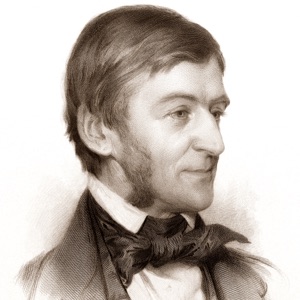
Ralph Waldo Emerson (1803 – 1882) was an American essayist, lecturer, philosopher, and poet who led the transcendentalist movement of the mid-19th century. Emerson served as a junior pastor in Boston’s Second Church, but after his first wife’s death, he began to disagree with the church’s methods, eventually leading to his resignation. Upon his return home from a tour of Europe in 1833 he began writing his first published essay, Nature. In March 1837 Emerson gave a series of lectures on the philosophy of history in Boston, which began his career as a lecturer. He eventually gave as many as 80 lectures a year, traveling across the United States. He disseminated his thoughts through dozens of published essays and more than 1,500 public lectures.

Quotes by Ralph Waldo Emerson…
There is at the surface infinite variety of things; at the center there is simplicity of cause.
Our strength grows out of our weakness. The indignation which arms itself with secret forces does not awaken until we are pricked and stung and sorely assailed. A great man is always willing to be little. Whilst he sits on the cushion of advantages, he goes to sleep. When he is pushed, tormented, defeated, he has a chance to learn something; he has been put on his wits, on his manhood; he has gained facts; learns his ignorance; he is cured of the insanity of conceit; he’s got moderation and real skill. The wise man throws himself on the side of his assailants. It is more his interest than it is theirs to find his weak point.
Though slowly and with pain, the objects of our affections change, as the objects of thought do. There are moments when the affections rule and absorb the man, and make his happiness dependent on a person or persons. But in health, the mind is presently seen again, its overarching vault, bright with galaxies of immutable lights, and the warm loves and fears that swept over us as clouds, must lose their finite character, and blend with God, to attain their own perfection. But we need not fear that we can lose any thing by the progress of the soul. The soul may be trusted to the end. That which is so beautiful and attractive as these relations, must be succeeded and supplanted only by what is more beautiful, and so on forever.
The Light by which we see this world comes out of the soul of the observer.
Whenever a mind is simple, and receives a divine wisdom, old things pass away: means, teachers, texts, temples fall. It lives now, and absorbs past and future into the present hour. All things are made sacred by relation to it, one as much as another. All things are dissolved to their centre by their cause, and, in the universal miracle, petty and particular miracles disappear.
Every man’s condition is a solution in hieroglyph to those inquiries he would put. He acts it as life before he apprehends it as truth.
Solitude, the safeguard of mediocrity, is to genius the stern friend, the cold, obscure shelter where moult the wings which will bear it farther than suns and stars. He who would inspire and lead his race must be defended from traveling with the souls of other men, from living, breathing, reading, and writing in the daily, time-worn yoke of their opinions.
Welcome evermore to gods and men is the self-helping man. For him all doors are flung wide. Him all tongues greet, all honors crown, all eyes follow with desire. Our love goes out to him and embraces him, because he did not need it. We solicitously and apologetically caress and celebrate him, because he held on his way and scorned our disapprobation. The gods love him because men hated him. “To the persevering mortal,” said Zoroaster, “the blessed Immortals are swift.”
Silence is a solvent that destroys personality, and gives us leave to be great and universal.
God offers to every mind its choice between truth and repose. Take which you please. You can never have both.
